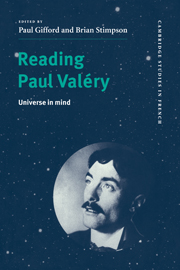Book contents
- Frontmatter
- Contents
- Contributors
- Abbreviations
- Introduction
- PART 1 SELF-SCIENCE
- PART 2 SELF-WRITINGS
- 6 The poetics of practice and theory
- 7 ‘Esprit, Attente pure, éternel suspens …’: Valéry's prose poetry
- 8 Counter-fiction
- 9 The Dialogues and Mon Faust: the inner politics of thought
- 10 Major poems: the voice of the subject
- 11 Other voices: intertextuality and the art of pure poetry
- 12 Manuscript steps: ‘Les Pas’
- PART 3 BODY, MIND, WORLD
- Conclusion
- Bibliography
- Index
- Cambridge Cultural Social Studies
12 - Manuscript steps: ‘Les Pas’
Published online by Cambridge University Press: 04 August 2010
- Frontmatter
- Contents
- Contributors
- Abbreviations
- Introduction
- PART 1 SELF-SCIENCE
- PART 2 SELF-WRITINGS
- 6 The poetics of practice and theory
- 7 ‘Esprit, Attente pure, éternel suspens …’: Valéry's prose poetry
- 8 Counter-fiction
- 9 The Dialogues and Mon Faust: the inner politics of thought
- 10 Major poems: the voice of the subject
- 11 Other voices: intertextuality and the art of pure poetry
- 12 Manuscript steps: ‘Les Pas’
- PART 3 BODY, MIND, WORLD
- Conclusion
- Bibliography
- Index
- Cambridge Cultural Social Studies
Summary
Access to an author's manuscripts has long been considered to offer a valuable means of renewing our vision of his writing. It is well known that Goethe, for example, built up a substantial collection of manuscripts by his contemporaries. But the extension of critical study from an author's published text to his rough drafts and the whole range of sketches and notes that are generically known as the avant-texte (or ‘prior text’) is a more recent phenomenon. While James Lawler was one of the first to venture into this field, genetic study as such only really began to develop in the early 1970s with the creation, within the Centre National de la Recherche Scientifique, of the Institut des Textes et Manuscrits modernes (ITEM); this Institute was dedicated to establishing the basis of a new discipline called genetic criticism or textual genetics. From the very beginning, the team of scholars working on Valéry's manuscripts has played a prominent and pioneering role.
Valéry's manuscripts constitute a remarkable corpus of raw material for this new type of exploration: for here is a poet who always valued the process of fabricating a poem more than the published work itself – which is considered almost as a ‘cast-off’ – and who dreamed of a form of criticism that might recompose the poem of the poem, and thereby mirror the genetic process itself.
- Type
- Chapter
- Information
- Reading Paul ValéryUniverse in Mind, pp. 200 - 216Publisher: Cambridge University PressPrint publication year: 1999



